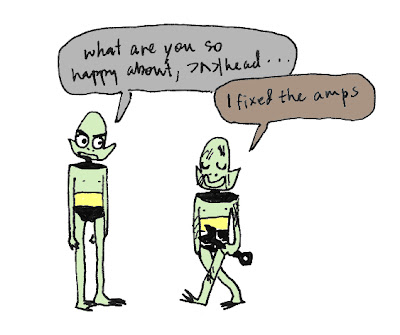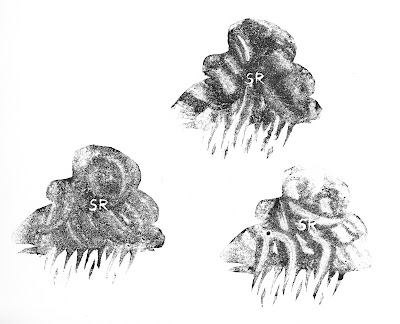I may have mentioned this before, I may have not: I make board games. When I began doing this exactly varies by your reckoning. The earliest demonstrable example is
Pit Fighter, ca. 1996, which, although a card-based dueling game, was unrelated to its better-known contemporary,
Magic: The Gathering. One of the major drawbacks of
Pit Fighter is that it didn't have any rules, but I liked making the cards.†
Later in life I convinced my high school English teacher that the best way to supplement a paper on the origin of ethics and morality was through a board game. I was raised by economists, so I guess it makes sense that I put a lot of value in behavioral models. Still, that doesn't explain why the board is two-and-a-half by four feet – perhaps my penchant for theater? The game plays like
The Game of Life, except you are cave people with different moral imperatives. The cannibals always won. My most popular game to date.
"What
Life needs is cannibals" – "
Risk would be better with wizards" – Thoughts like these more or less drive my will to improve the games of our lives. The latter, for the most part. I don't just add rules, though: I remake the whole thing, top to bottom. This process is eternal. Every year I roll out a few of my games, make sure the pieces are all there, and see if the rules could be improved. Lately it's been the game where everybody's an archaeologist trying to get tenure,†† and the game that ends in four or five different ways.
That brings me to the game I'm working on today. It's part of a project where I give the players lots of conflicting alternatives for ending the game (hence, The Game That Ends in Four or Five Different Ways). The idea partly comes from
Carcassonne: The Discovery. I'm a die-hard fan of the
Carcassonne series. It's one of the best ever.
Read all about it. Still, every time I play
The Discovery, I really want to be a wizard – gather mandrake roots in the mountains, meddle with politics in all the little cities with my little Meeple Minions, that sort of thing. I'd say it's coming along well.
 You explore tiles like these – through forest, tundra, and mountain – searching for magic artifacts, meeting mysterious allies, and probably making an enemy of some political faction or other. The next image is an example of how you might place the tiles:
You explore tiles like these – through forest, tundra, and mountain – searching for magic artifacts, meeting mysterious allies, and probably making an enemy of some political faction or other. The next image is an example of how you might place the tiles:
 It may look a little like Carcassonne: The Discovery, but the resemblance is superficial. There are a couple packs of cards for allies, events, items, that sort of thing. Maybe there's a plague, or a festival, or you meet a caravan; whatever. You also make die rolls to determine whether you discover anything – herbs, hidden places, monsters. I'm poking through the rules to make sure they're balanced, and to see if they're better off being toned down.
It may look a little like Carcassonne: The Discovery, but the resemblance is superficial. There are a couple packs of cards for allies, events, items, that sort of thing. Maybe there's a plague, or a festival, or you meet a caravan; whatever. You also make die rolls to determine whether you discover anything – herbs, hidden places, monsters. I'm poking through the rules to make sure they're balanced, and to see if they're better off being toned down.
 See, right – sometimes you're exploring in a swamp or something, and you find hidden places. The skulls are in case a city gets destroyed and we need to indicate that. Razed cities can have a major impact on the end of the game, I'm sure you can imagine. There are also little cork-tokens like these with colors on them, in case the cities change factions (way better than destroying them, right?), but I didn't think you wanted to see corky little circles of color.
See, right – sometimes you're exploring in a swamp or something, and you find hidden places. The skulls are in case a city gets destroyed and we need to indicate that. Razed cities can have a major impact on the end of the game, I'm sure you can imagine. There are also little cork-tokens like these with colors on them, in case the cities change factions (way better than destroying them, right?), but I didn't think you wanted to see corky little circles of color.
 At the beginning of the game you roll some dice to determine what sort of person you are – how tough, how smart, etc. – based on some mumbo-jumbo. This wheel articulates that mumbo-jumbo via seasons, phases of the moon, and caste within society. I like my games to resemble old NES games, where the manual has tons of back-story, but you won't be completely clueless if you don't read it.
At the beginning of the game you roll some dice to determine what sort of person you are – how tough, how smart, etc. – based on some mumbo-jumbo. This wheel articulates that mumbo-jumbo via seasons, phases of the moon, and caste within society. I like my games to resemble old NES games, where the manual has tons of back-story, but you won't be completely clueless if you don't read it.
 Although I see nothing in the current rules that addresses this thing, I think it lets you store a spell to use it later – really, your guess is as good as mine.
Although I see nothing in the current rules that addresses this thing, I think it lets you store a spell to use it later – really, your guess is as good as mine.
But, it is awesome.===========================
===========================
†Yes, I enjoyed laminating. Man, did I laminate a lot of cards. Two editions of cards, with different backings. Without rules. And now that I think about it, this continues to be the pattern of my game-making to the present day.
††My second-most popular game. Now in its third draft, "The Archaeologist Game" is in fact the progenitor of "The Game That Ends in Four-to-Five Different Ways," but they diverged last year in the interest of wizards.
===========================
===========================
Also, If you're interested in testing this and other games with me, please get in touch and we'll see if that's geographically and chronologically possible. Just click the alien in the sidebar.
























































